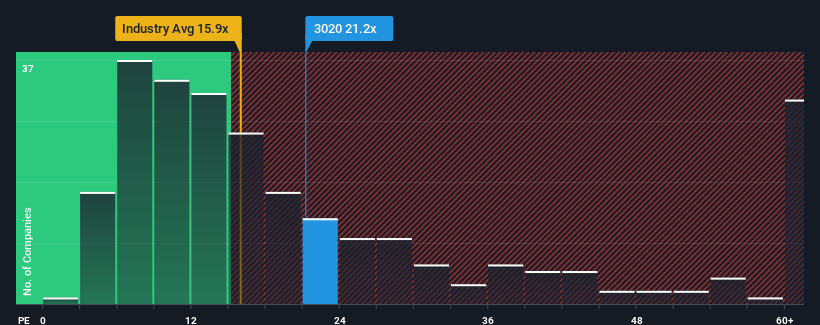- Saudi Arabia
- /
- Basic Materials
- /
- SASE:3020
There Is A Reason Yamama Saudi Cement Company's (TADAWUL:3020) Price Is Undemanding

With a price-to-earnings (or "P/E") ratio of 21.2x Yamama Saudi Cement Company (TADAWUL:3020) may be sending bullish signals at the moment, given that almost half of all companies in Saudi Arabia have P/E ratios greater than 26x and even P/E's higher than 41x are not unusual. Nonetheless, we'd need to dig a little deeper to determine if there is a rational basis for the reduced P/E.
While the market has experienced earnings growth lately, Yamama Saudi Cement's earnings have gone into reverse gear, which is not great. It seems that many are expecting the dour earnings performance to persist, which has repressed the P/E. If you still like the company, you'd be hoping this isn't the case so that you could potentially pick up some stock while it's out of favour.
See our latest analysis for Yamama Saudi Cement

What Are Growth Metrics Telling Us About The Low P/E?
There's an inherent assumption that a company should underperform the market for P/E ratios like Yamama Saudi Cement's to be considered reasonable.
If we review the last year of earnings, dishearteningly the company's profits fell to the tune of 30%. This means it has also seen a slide in earnings over the longer-term as EPS is down 8.8% in total over the last three years. So unfortunately, we have to acknowledge that the company has not done a great job of growing earnings over that time.
Turning to the outlook, the next three years should generate growth of 9.2% per annum as estimated by the four analysts watching the company. That's shaping up to be materially lower than the 14% per annum growth forecast for the broader market.
With this information, we can see why Yamama Saudi Cement is trading at a P/E lower than the market. It seems most investors are expecting to see limited future growth and are only willing to pay a reduced amount for the stock.
What We Can Learn From Yamama Saudi Cement's P/E?
While the price-to-earnings ratio shouldn't be the defining factor in whether you buy a stock or not, it's quite a capable barometer of earnings expectations.
We've established that Yamama Saudi Cement maintains its low P/E on the weakness of its forecast growth being lower than the wider market, as expected. At this stage investors feel the potential for an improvement in earnings isn't great enough to justify a higher P/E ratio. Unless these conditions improve, they will continue to form a barrier for the share price around these levels.
There are also other vital risk factors to consider before investing and we've discovered 1 warning sign for Yamama Saudi Cement that you should be aware of.
Of course, you might find a fantastic investment by looking at a few good candidates. So take a peek at this free list of companies with a strong growth track record, trading on a low P/E.
New: Manage All Your Stock Portfolios in One Place
We've created the ultimate portfolio companion for stock investors, and it's free.
• Connect an unlimited number of Portfolios and see your total in one currency
• Be alerted to new Warning Signs or Risks via email or mobile
• Track the Fair Value of your stocks
Have feedback on this article? Concerned about the content? Get in touch with us directly. Alternatively, email editorial-team (at) simplywallst.com.
This article by Simply Wall St is general in nature. We provide commentary based on historical data and analyst forecasts only using an unbiased methodology and our articles are not intended to be financial advice. It does not constitute a recommendation to buy or sell any stock, and does not take account of your objectives, or your financial situation. We aim to bring you long-term focused analysis driven by fundamental data. Note that our analysis may not factor in the latest price-sensitive company announcements or qualitative material. Simply Wall St has no position in any stocks mentioned.
Have feedback on this article? Concerned about the content? Get in touch with us directly. Alternatively, email editorial-team@simplywallst.com
About SASE:3020
YAMAMA Cement
Engages in the manufacture, production, and trading of cement in Saudi Arabia.
Undervalued with solid track record.
Similar Companies
Market Insights
Community Narratives



